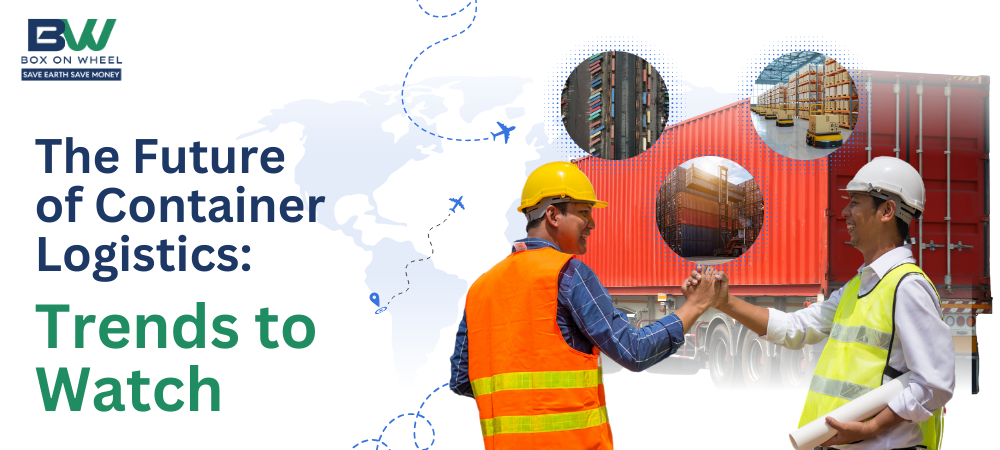In recent years, the container logistics industry has grown rapidly, largely because of increased global trade and the rise of e-commerce. Consumers expect fast delivery, which pushes logistics companies to speed up operations. However, managing this demand is challenging. Congested ports slow down shipments, while a shortage of labor makes it hard to meet service needs. Rising operational costs also add strain, as companies must balance demand with efficient spending.
COVID-19 brought added pressure, revealing supply chain vulnerabilities. Shipping delays and product shortages became common, showing that logistics needed more flexible strategies. These challenges have encouraged the industry to consider sustainable methods, invest in digital technology, and focus on strong supply chains.
Sustainability Focus in Container Logistics
Sustainability is a growing priority in logistics. Many companies are adopting eco-friendly practices like container triangulation and reuse to reduce their impact on the environment. This shift is partly due to new regulations and also because businesses want to reduce their carbon footprints.
Decarbonisation Initiatives
Logistics companies are cutting emissions by using alternative fuels and energy-efficient technologies.
Circular Economy Practices
More companies are adopting a “reduce, reuse, recycle” approach. By reusing materials and recycling packaging, they aim to lower waste, which benefits the environment and cuts costs.
Sustainable Supply Chain Management
Many firms are also focusing on responsible sourcing to reduce their total carbon output. By choosing suppliers who follow sustainable practices, logistics companies can support a greener supply chain.
Digital Transformation in Container Logistics
Digital technology is transforming container logistics. It helps companies work faster, lowers costs, and offers better visibility of their supply chains. Here are some key digital trends:
Automation and AI
Automated systems are used to handle and track containers, which speeds up operations. AI-driven analytics also help companies make informed decisions by offering insights into supply chain performance.
Internet of Things (IoT)
IoT devices allow real-time monitoring of containers, which improves visibility along the supply chain. This technology helps logistics managers monitor stock levels and reduce delays.
Digital technology streamlines logistics, helping companies manage complex operations with fewer resources. By investing in these tools, companies can stay competitive and ready for future challenges.
Strengthening Supply Chain Resilience
The pandemic highlighted the need for stronger supply chains. Disruptions during COVID-19 showed that logistics operations needed to be more adaptable. Some key lessons are shaping today’s resilience efforts:
Diversifying Supply Sources
Many companies no longer rely on single suppliers. By diversifying, they reduce the risk of interruptions caused by natural disasters or political issues.
Technology Investments
Many logistics companies now use data analytics and forecasting tools to prepare for disruptions. These tools help businesses make quick, informed decisions when issues arise.
Collaborating Across the Supply Chain
Improved communication between suppliers, shippers, and tech providers helps to solve problems faster. By working closely, each part of the supply chain can respond better during crises.
Resilience strategies are now essential in container logistics. Stronger supply chains mean fewer disruptions, even during unexpected global events.
What Can We Conclude?
Container logistics is set for transformative change, and companies that proactively adapt will have a strategic edge. Key areas include adopting sustainable practices, investing in digitalisation, and building resilient supply chains. Staying ahead of regulatory changes is also essential, as it helps logistics firms avoid potential fines and maintain operational efficiency.
A notable trend is container triangulation, as offered by Box on Wheels, which minimizes empty container trips by coordinating the direct reallocation of containers between different locations or customers. This approach saves fuel, cuts emissions, and reduces overall costs, making operations more efficient and environmentally friendly.
As the industry progresses, the road ahead will undoubtedly bring challenges but also significant opportunities. One can adopt digitalisation and sustainable strategies. Logistics companies can enhance service quality and remain competitive in a global market. Not only does this approach protect the core business, but it also plays a crucial role in creating a more sustainable and efficient global trade network.
In the rapidly evolving logistics landscape, adaptability is essential. Those who respond to these trends will build a foundation for long-term success, establishing themselves as leaders in an increasingly competitive industry.

